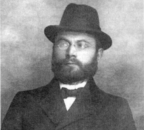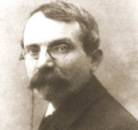On May 3rd, 2023, the Zahava and Moshael Straus Center for Torah and Western Thought, in partnership with the Jay and Jeanie Schottenstein Honors Program, hosted Dr. Marc B. Shapiro, renowned scholar of Jewish history, theology, philosophy and Jewish literature. Dr. Shapiro, who holds the Harry and Jeanette Weinberg Chair in Judaic Studies at the University of Scranton, spoke to students on the subject of his book Between the Yeshiva World and Modern Orthodoxy: The Life and Works of Rabbi Jehiel Jacob Weinberg (2002), a National Jewish Book Award finalist.
 Rabbi Yechiel Yaakov Weinberg
Rabbi Yechiel Yaakov WeinbergDr. Shapiro considered the life and works of Rabbi Jehiel Jacob Weinberg (1884–1966), last Rosh Yeshiva of the famous Hildesheimer Seminar in Berlin (one of the precursors to Yeshiva University; 1873-1938) and author of numerous responsa which after the Holocaust were published as the Seridei Eish, the Remnants from the Fire (1961-1966). One of Rabbi Weinberg’s lesser-known works is Lifrakim, a collection of essays on mussar and aggadah, which in some editions includes an essay on faith that presents a surprisingly sympathetic portrayal of the Hebrew novelist Micha Josef Berdyczewski (1865-1921).
 Micha Josef Berdyczewski
Micha Josef BerdyczewskiBerdyczewski, like most other Hebrew novelists of his time, was critical of traditional Jewish belief and practice. However, whereas other authors vehemently opposed the Jewish tradition itself as antiquated and completely irrelevant to modern life, Berdyczewski treasured the Rabbinic literary tradition and sought to transmute it into the foundation of an academically oriented secular-Jewish culture. Precisely because Berdyczewski cherished tradition, Orthodox leaders considered him all the more insidious and polemicized strongly against his works. Dr. Shapiro explained that Rabbi Weinberg appreciated the Hebrew novelists. He was especially grateful for their revitalization of the Hebrew language, and felt that Berdyczewski in particular offered something unique, something that Orthodox Jews should internalize.
In Weinberg’s essay which first appeared in the journal Jeschurun (1914-1930), the Seridei Eish asserts that Berdyczewski is so compelling because his heresy was not propped up by dry academic arguments or motivated by base desire, rather Berdyczewski’s heresy was a “pure” heresy that arouse from the same spiritual yearnings that give rise to pure Jewish belief. In other words, Berdyczewski’s heresy was the result of his own grappling with Jewish tradition, theodicy, and nature. Berdyczewski arrived at his heresy by meditating on divinity, which is more than can be said for many Orthodox Jews who blithely express belief in God and the Torah without ever struggling with the meaning and basis of that belief. “For [Rabbi Weinberg],” Dr. Shapiro explained. “These questions of belief are supposed to keep us up at night.” Dr. Shapiro demonstrated parallel ideas expressed by Rabbi Dr. Joseph B. Soloveitchik in Halakhic Man (1989), and even in the works of the British philosopher/Christian apologist G. K. Chesterton. In Orthodoxy (1909), Chesterton wrote: “People have fallen into a foolish habit of speaking of orthodoxy as something heavy, humdrum, and safe. There never was anything so perilous or so exciting as orthodoxy.”
This seminar was the latest in a series of programs sponsored or co-sponsored by the Straus Center and the Schottenstein Honors Program. Recent events have included a conversation with the Jerusalem Post’s Zvika Klein, a debate between Tablet’s Liel Leibovitz and YU’s own Rabbi Daniel Feldman, a lunch seminar with Adam Kirsch of The Wall Street Journal, a philosophical discussion with Dr. Ronen Shoval of The Tikvah Fund, a book talk with Dr. Gil Troy of McGill University, a foray into Jewish philosophy with Dr. Daniel Rynhold, Dean of Bernard Revel Graduate School of Jewish Studies.
